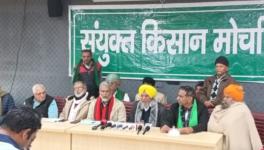Govt’s Claims On MGNREGA Wages Paid On Time Incorrect, Says Study

Image Courtesy: The Wire
The Modi-led NDA government owes wages up to Rs 3,243 crore to workers under the Mahatma Gandhi National Rural Employment Guarantee Act (MGNREGA), said activists on 1 December, as a new study reported that the government has been making incorrect claims about the payments made on time.
In September, the Ministry of Rural Development (MoRD) had claimed that “around 85% of the wages are being paid to the workers in time” in the 2017-18 financial year (FY).
But an independent study, carried out in 3,603 gram panchayats across ten states, has found that only 32% of the due payments were released on time (within 15 days of completion of the work week) in the first two quarters of FY 2017-18.
“For the remainder of the 68% of the total transactions in this sample, delays are either completely unaccounted for or only the state responsibility for delay is computed for payment of compensation”, said the NREGA Sangharsh Morcha (a platform of workers, activists, unions and organisations engaged in public action on NREGA) in a statement issued after a press conference on 1 December.
The study was conducted by Rajendran Narayanan from the Azim Premji University along with independent researchers Sakina Dhorajiwala and Rajesh Golani.
In fact, the same researchers had earlier conducted a similar study for the 2016-17 financial year, analysing MGNREGA payments in 3,446 panchayats across 10 states.
And the Ministry of Finance (MoF) acknowledged the findings, reported in the media this August, in an internal report dated 21 August.
The study showed, just like the one conducted this year, that the BJP-led NDA government has been grossly under-calculating the delay in wages due to flawed methodology.
Under the MoRD’s National Electronic Fund Management System (NeFMS), which is supposed to do real time transfer of wages, a Fund Transfer Order (FTO) is generated at the block/panchayat level on completion of the work week.
After that, the Centre approves the FTO digitally and the payment is processed electronically. “After passing through a notional State government bank account the wage is directly transferred to the individual worker’s bank or postal account,” as the study says.
But as the researchers found, the government does not calculate the delay that happens after the FTO is generated at the block/panchayat.
“Therefore, for the sample panchayats instead of the actual compensation of 7.52 crores payable ascompensation, the Management Information System has only calculated Rs. 1.03 crores - an underestimation of 86% (for FY 2017-18),” said the statement.
“If this trend holds true for the entire country, then the true payable delay compensation would be Rs. 76 crore,” it added.
This means that not only are workers not being paid on time, but they are even being deprived of the compensation due to them on account of the delays.
The Sangharsh Morcha said the FTOs were pending at the level of the central government at the Public Fund Management System. “Overall pendency of Fund Transfer Orders generated and not processed by the Public Fund Management System due to a lack of funds at the level of the Central Government is 77%,” they said.
The MoF, too, acknowledged that “the current rules do not compute nor compensate the delay in payments after the generation of FTOs”.
The MoF internal report also suggested that the main reasons for such delays in payments were “infrastructural bottlenecks, (the lack of) availability of funds and lack of administrative compliance.”
As the NREGA Sangharsh Morcha stated, “For the last two months, there has been an almost 100% pendency, of all Fund Transfer Orders generated by the State Governments, pending for processing at the level of the Ministry of Rural Development. This is only intermittently broken as piecemeal funds are transferred to State Governments.”
According to the Morcha’s findings, as on 29 November, wage payments had not been made in Kerala (the first state to pilot the NeFMS) since 71 days, in Haryana since 59 days, in Uttarakhand since 40 days, in Punjab since 39 days, in West Bengal since 36 days, and in Karnataka since 33 days.
The activists said that upon analysing the status of FTO Pendency at PFMS Server after NeFMS implementation, they found that the MoRD has not paid wages amounting to at least Rs 3,243 crore, leading to a “crisis” situation.
“Wages worth Rs. 3243 crores are pending as of today. Given the drying up of funds this figure is likely to be exacerbated in the days to come, intensifying the crisis,” said the Sangharsh Morcha.
“It is clear that the lack of adequate funds is one major reason for the MGNREGA is being derailed from its core objective of being a demand driven program,” added the Morcha.
“This is a total violation of a direct order from the Supreme Court,” the statement said, “to clear all pending wages and to pay compensation for the delay, albeit under calculated.
The NREGA Sangharsh Morcha has demanded that the government immediately clear all pending FTOs; pay full compensation for the delay at both the state and central level; make available an adequate budget for the scheme; and provide work as per demand.
Get the latest reports & analysis with people's perspective on Protests, movements & deep analytical videos, discussions of the current affairs in your Telegram app. Subscribe to NewsClick's Telegram channel & get Real-Time updates on stories, as they get published on our website.























